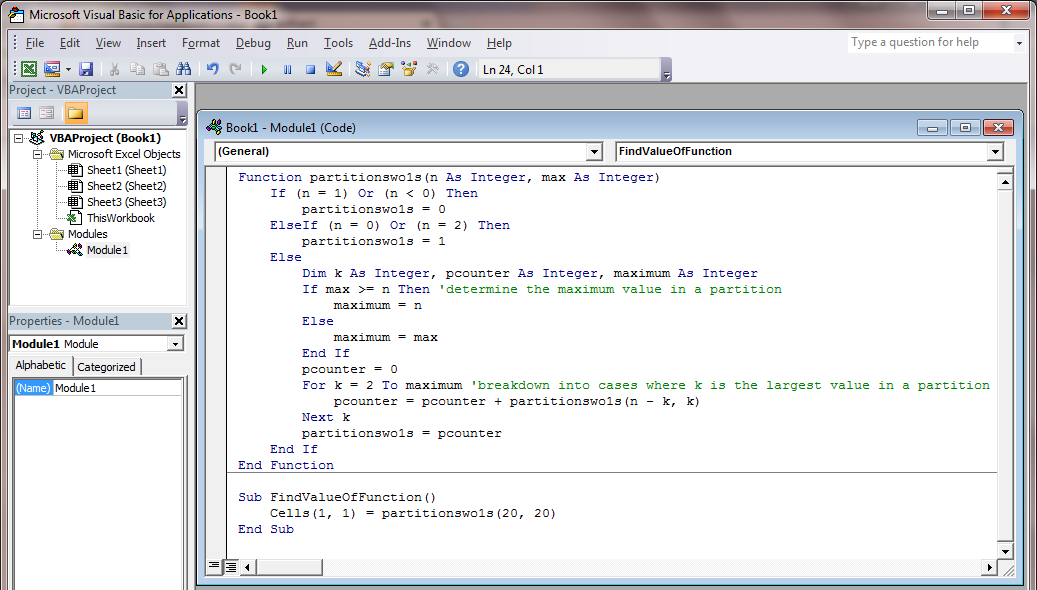Partitions with no 1s
p ( 1 7 ) p ( 1 8 ) p ( 1 9 ) p ( 2 0 ) p ( 2 1 ) = 2 9 7 = 3 8 5 = 4 9 0 = 6 2 7 = 7 9 2
Let p ( n ) be the number of partitions of an integer n . The values of p ( 1 7 ) , p ( 1 8 ) , p ( 1 9 ) , p ( 2 0 ) , p ( 2 1 ) are as shown above.
How many partitions of 20 are there that do not contain any parts equal to 1?
The answer is 137.
This section requires Javascript.
You are seeing this because something didn't load right. We suggest you, (a) try
refreshing the page, (b) enabling javascript if it is disabled on your browser and,
finally, (c)
loading the
non-javascript version of this page
. We're sorry about the hassle.
4 solutions
It is hard to construct interesting problems about partitions that lend themselves to the Brilliant format (i.e. the answer is a nontrivial number). If you can think of any, it would be much appreciated.
I just love your solution, Jon !! For those who would like to see a printout of each partition of 20 which does not have a 1 in it, just execute this bit of code in SAGE :
PL=Partitions(20).list()
cnt=0
for n in srange(0,627):
if 1 not in PL[n]:
print PL[n]
cnt+=1
print cnt
That last print command gives the answer 1 3 7
Length [ IntegerPartitions [ 2 0 , 1 0 , Range [ 2 , 2 0 ] ] ] ⇒ 1 3 7
I could use Fermat's excuse for not writing out his proof: "The margin is not large enough.," as a reason for not presenting the solution list; but, I will give it anyway in hopes of helping someone .
{{20},{18,2},{17,3},{16,4},{16,2,2},{15,5},{15,3,2},{14,6},{14,4,2},{14,3,3},{14,2,2,2},{13,7},{13,5,2},{13,4,3},{13,3,2,2},{12,8},{12,6,2},{12,5,3},{12,4,4},{12,4,2,2},{12,3,3,2},{12,2,2,2,2},{11,9},{11,7,2},{11,6,3},{11,5,4},{11,5,2,2},{11,4,3,2},{11,3,3,3},{11,3,2,2,2},{10,10},{10,8,2},{10,7,3},{10,6,4},{10,6,2,2},{10,5,5},{10,5,3,2},{10,4,4,2},{10,4,3,3},{10,4,2,2,2},{10,3,3,2,2},{10,2,2,2,2,2},{9,9,2},{9,8,3},{9,7,4},{9,7,2,2},{9,6,5},{9,6,3,2},{9,5,4,2},{9,5,3,3},{9,5,2,2,2},{9,4,4,3},{9,4,3,2,2},{9,3,3,3,2},{9,3,2,2,2,2},{8,8,4},{8,8,2,2},{8,7,5},{8,7,3,2},{8,6,6},{8,6,4,2},{8,6,3,3},{8,6,2,2,2},{8,5,5,2},{8,5,4,3},{8,5,3,2,2},{8,4,4,4},{8,4,4,2,2},{8,4,3,3,2},{8,4,2,2,2,2},{8,3,3,3,3},{8,3,3,2,2,2},{8,2,2,2,2,2,2},{7,7,6},{7,7,4,2},{7,7,3,3},{7,7,2,2,2},{7,6,5,2},{7,6,4,3},{7,6,3,2,2},{7,5,5,3},{7,5,4,4},{7,5,4,2,2},{7,5,3,3,2},{7,5,2,2,2,2},{7,4,4,3,2},{7,4,3,3,3},{7,4,3,2,2,2},{7,3,3,3,2,2},{7,3,2,2,2,2,2},{6,6,6,2},{6,6,5,3},{6,6,4,4},{6,6,4,2,2},{6,6,3,3,2},{6,6,2,2,2,2},{6,5,5,4},{6,5,5,2,2},{6,5,4,3,2},{6,5,3,3,3},{6,5,3,2,2,2},{6,4,4,4,2},{6,4,4,3,3},{6,4,4,2,2,2},{6,4,3,3,2,2},{6,4,2,2,2,2,2},{6,3,3,3,3,2},{6,3,3,2,2,2,2},{6,2,2,2,2,2,2,2},{5,5,5,5},{5,5,5,3,2},{5,5,4,4,2},{5,5,4,3,3},{5,5,4,2,2,2},{5,5,3,3,2,2},{5,5,2,2,2,2,2},{5,4,4,4,3},{5,4,4,3,2,2},{5,4,3,3,3,2},{5,4,3,2,2,2,2},{5,3,3,3,3,3},{5,3,3,3,2,2,2},{5,3,2,2,2,2,2,2},{4,4,4,4,4},{4,4,4,4,2,2},{4,4,4,3,3,2},{4,4,4,2,2,2,2},{4,4,3,3,3,3},{4,4,3,3,2,2,2},{4,4,2,2,2,2,2,2},{4,3,3,3,3,2,2},{4,3,3,2,2,2,2,2},{4,2,2,2,2,2,2,2,2},{3,3,3,3,3,3,2},{3,3,3,3,2,2,2,2},{3,3,2,2,2,2,2,2,2},{2,2,2,2,2,2,2,2,2,2}}
To have partitions of 20 where none of the parts equal 1, we'll have to subtract partitions of 20 having parts containing 1 from total no.of parts. So desired number is p(20)-P(20,1). From our theorem in identical objects into identical bins p(20,1)=p(19).Thus desired number is p(20)-p(19). =>627-490=137.
I simply wrote this code in Excel VBA:

For a positive integer n , consider a partition of n that contains a 1. If we remove this 1, then we obtain a partition of n − 1 . Conversely, if we take a partition of n − 1 and add a 1, then we create a partition of n that contains a 1. Thus, there is a bijection between partitions of n that contain a 1 and partitions of n − 1 .
Hence, the number of partitions of 20 that do not contain a 1 is p ( 2 0 ) − p ( 1 9 ) = 1 3 7 .